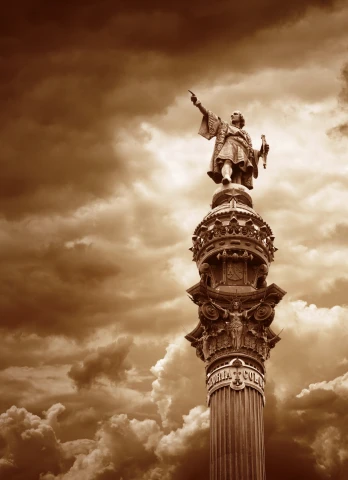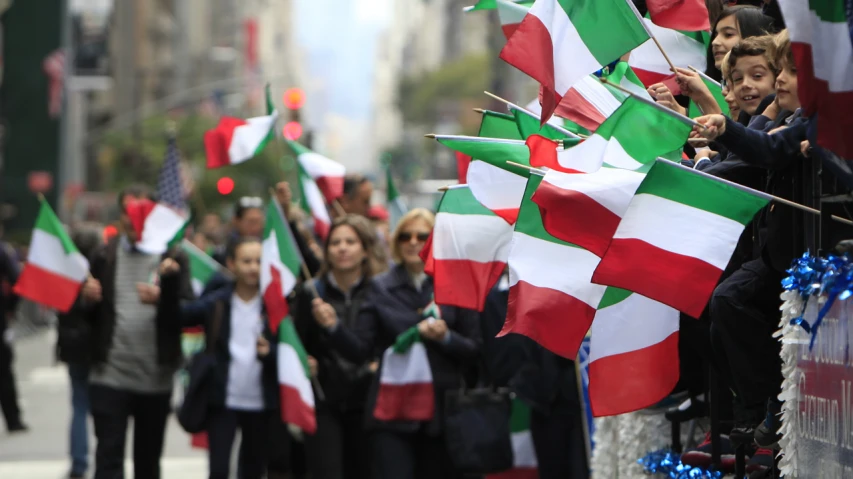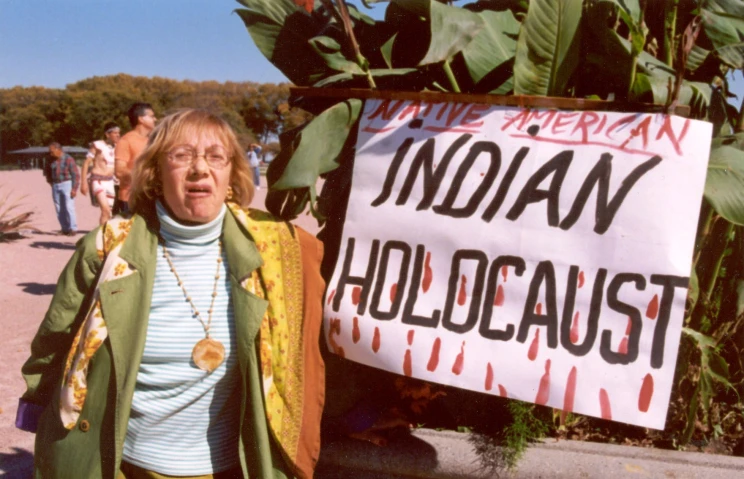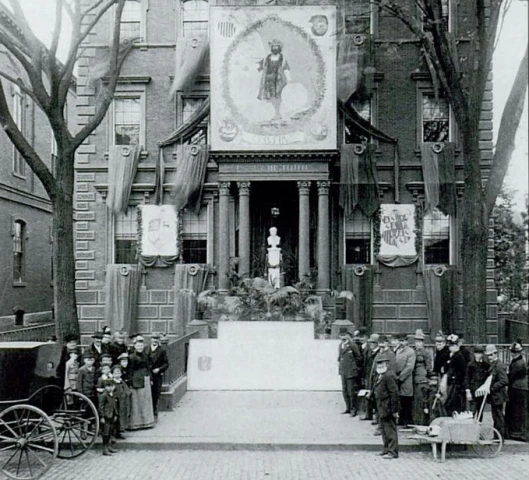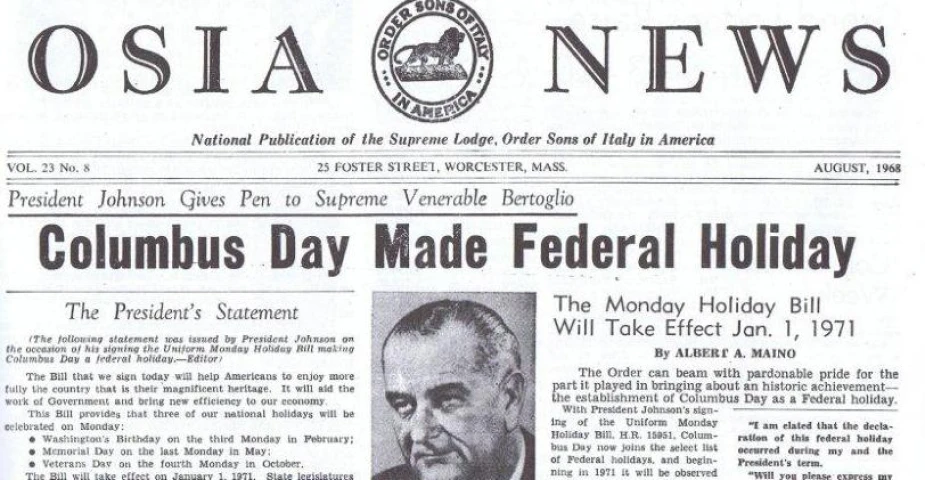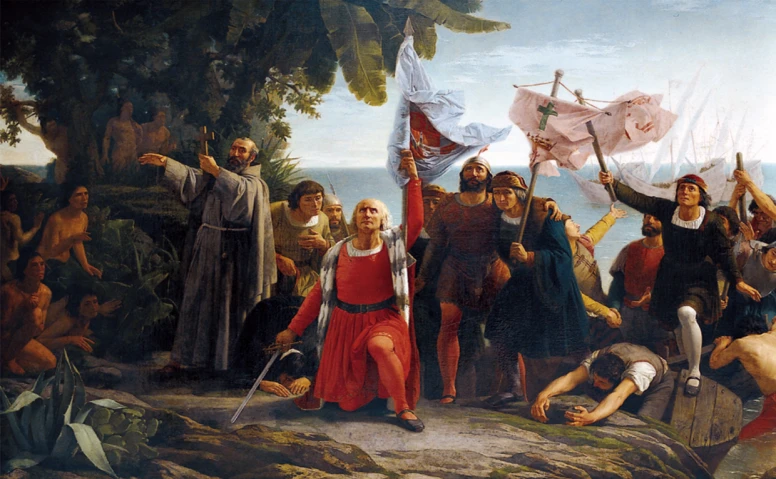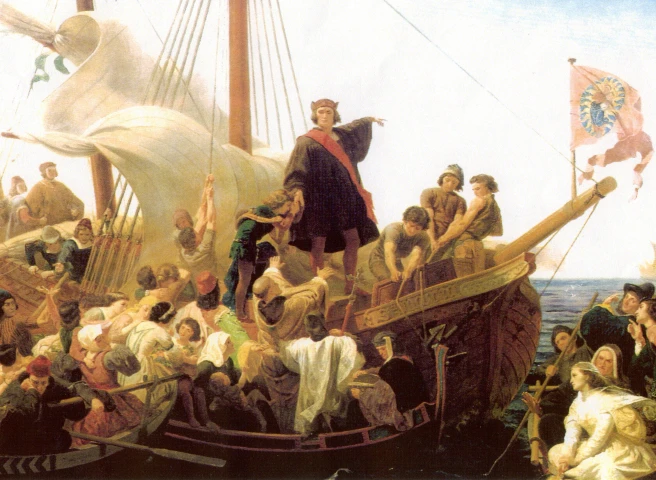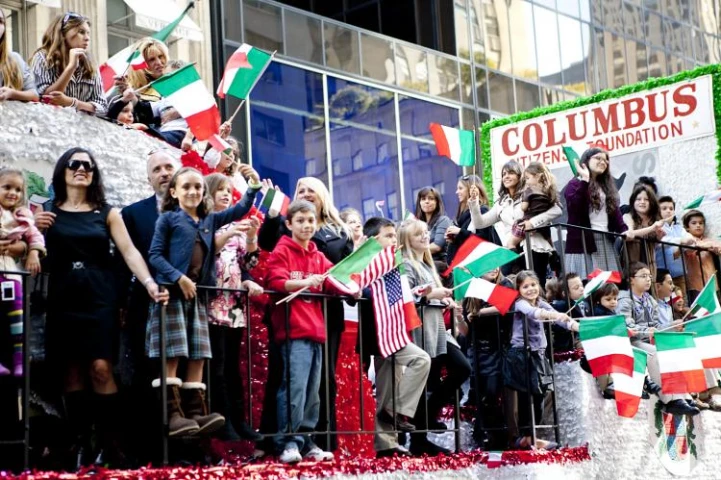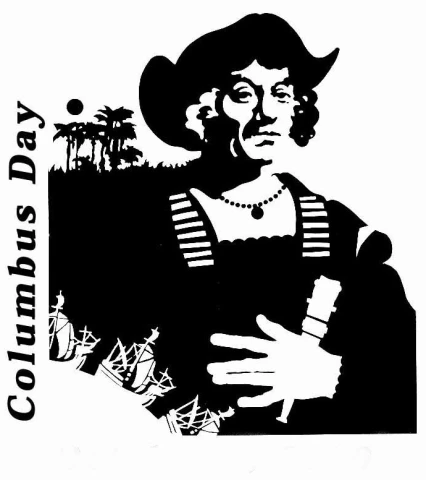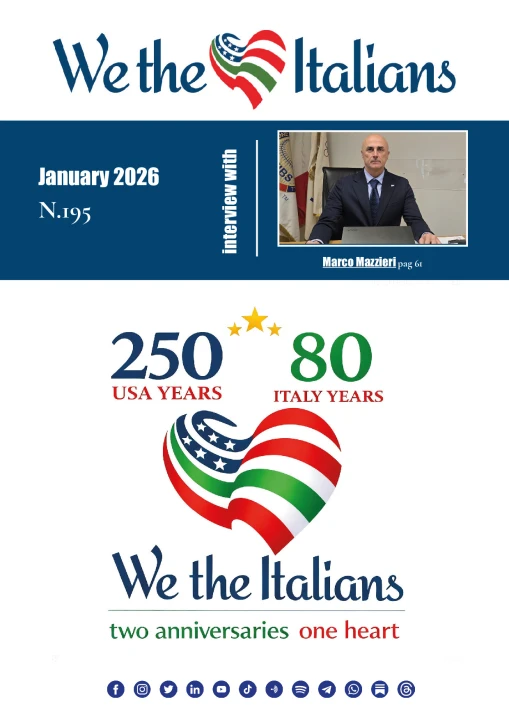In the United States there are 144 places named after Columbus: cities, towns, lakes, rivers, provinces, villages, townships, counties and of course the District of Columbia. America also has more than 200 statues, busts, monuments, memorials, bas reliefs dedicated to him; while it's impossible to count paintings and other artworks. Nevertheless, in the United States today Christopher Columbus is under attack. It is something growing fast year by year: municipalities are canceling Columbus Day, replacing it with Indigenous People's Day; op-ed in the main newspapers call Columbus "the Hitler of the 15th century"; statues of Columbus are vandalized in several parts of the country.
To know more about this fundamental topic that is dividing the Italian American community, we welcome today Dona De Sanctis, who is the only person to have worked – and with important responsibilities - for the two biggest Italian American organizations, NIAF and OSIA. We are very thankful to her for this opportunity.
In 2005 the Order Sons of Italy in America published the study "Columbus: Fact vs. Fiction". Dona, you were OSIA Deputy Executive Director at that time, and you were the one who prepared the study. Please tell us more about this
I researched and wrote this study about 12 years ago because, like many Italian Americans, I was concerned about the way Columbus was being taught in American schools. When I was growing up in New York City, my teachers presented Columbus as an intrepid explorer, who believed in himself and his abilities. He proved the earth was round and that one could sail across a huge ocean and survive. His character was something we were supposed to admire and emulate.
Today, however, he is depicted as a cruel, bloodthirsty exploiter of native cultures and has become the poster boy for man's inhumanity to man. His character was defamed and his accomplishments demeaned. I wanted to set the record straight.
This study is now on the osia.org website and can be downloaded for free. I have heard that some teachers use it to give a more balanced portrayal of Columbus than is now found in the textbooks our children study from. Parents should download the study and discuss it with their children ... especially in October.
The study also stresses how unfair it is to judge a 15th century man by 21st century values. In Columbus's time, Europeans suffered often-gruesome fates: they were drawn and quartered; burned at the stake (Joan of Arc), thrown into dungeons for life; poisoned, oppressed, and even enslaved. We have come a long way from those times. Columbus needs to be studied in the context of his time not ours.
What did the study reveal about Columbus?
It reveals his contributions to navigation, his treatment of the Indians, his deep religious faith, and his importance historically. It also supports the argument that we should celebrate Columbus Day.
Perhaps his greatest accomplishment was that he was the first to open permanent relations between the American continent and Europe. As a result, over the centuries since his four voyages, millions of Europeans have come to America. They helped build this nation with their hard work and strong values. America has an enormous debt to its European immigrants, the first of whom was Columbus.
The study also reveals the unbalanced portrayal of Columbus's relations with the Indians. Historians have focused on the punitive measures Columbus took when the Indian tribes failed to produce the gold he was contracted to send to Spain. This, unfortunately, is true. They also accuse him of being a slave trader and a racist. This is untrue.
Columbus never bought or sold slaves. And, far from a racist, in his captain's logs, he describes the Indians he found as being handsome, well formed, generous, and intelligent. Our children never learn how Columbus defended the Tainos, a peaceful tribe that was being attacked by the Caribs and Cannibs, who killed the men and enslaved the women and children. The Cannibs, who gave us the word "cannibal", were particularly barbaric. In gratitude, one Taino chieftain made Columbus a blood brother. So while it is true that Columbus was cruel to Indians who worked for him, he was a savior to others. Both sides of the story need to be told, which is what the study attempts to do.
Why does Columbus matter?
Columbus was a European born on a continent that has made enormous contributions to science, medicine, art, music, law, philosophy, and literature over the centuries. Greek democracy, Roman law, Judeo-Christian ethics and the belief that "all men are created equal" are just a few of the European pillars of civilization that have helped make America what it is today. So Columbus matters not just for his historical significance, but also as a symbol of what Europe and its people have contributed to the world and especially to these United States of America.
I've often read the phrase "Columbus was no saint", to admit that he had his flaws. But there's a more interesting and almost unknown story about this topic, right?
In 1882, a group of Irish American Catholics in Connecticut founded a fraternal organization they called the Knights of Columbus. Its mission was to help the needy and support Catholicism. They named it in honor of Columbus not only because he was Catholic, but also because he discovered the New World. For this reason, Columbus was considered one of the most important figures in America's young history along with Washington, Jefferson, and Benjamin Franklin.
Shortly after the Knights of Columbus was formed, Italian Americans launched a campaign to have the Italian explorer canonized as a saint in the Roman Catholic church because his logs revealed he saw bringing Christianity to the Indians as part of his mission in the New World. The Knights of Columbus supported this initiative.
A papal inquest into Columbus's life was opened but ultimately the Church rejected his candidacy for sainthood because Columbus had had a 20-year relationship with Beatriz Enriquez de Harana who bore him an illegitimate son, Ferdinand, in 1488. They never married and even though Columbus was faithful to her and provided for her in his will, the Church decided that he was not a candidate for sainthood.
What should Italian American communities do to defend Columbus Day?
Italian American communities are already defending this federal holiday by holding parades and other celebrations across the nation. They need to be more active in contacting their elected officials, engaging their support for the holiday and what it represents to all Italian Americans. This is a political issue not a cultural one. Special interest groups representing minorities in towns, cities and states have been using Columbus Day and the defamation of Columbus to further their own political and social agendas. We Italian Americans, the fifth largest ethnic group in the US, need to organize as well, marshalling our political clout to preserve this holiday. This is being done here and there. We need to do it on a much larger and more unified scale.
Are Italian Americans the only group it is not politically incorrect to stereotype?
I don't say we are the only group, but I believe that, at 20 million strong, we are certainly the largest group. For decades Hollywood and television have been making huge amounts of money by denigrating our culture and presenting us as either gangsters or uneducated buffoons. There has never been a balanced portrayal of us to the larger American public. In a sense, our reputation has been defamed much as Columbus's has!
What is the fate of Columbus Day?
I don't think it will be abolished, but as we have seen, it has certainly been diminished. Schools choose to stay open on this federal holiday; some cities and states have renamed the holiday to honor Native Americans; and controversy continues to swirl around Columbus as an important historical figure.
But today, more than 500 years after his first voyage, the holiday named for Columbus is really a celebration of Italian Americans and their contributions to America. This is a little-known story ... even among Italian Americans themselves. So I think that while we should keep the name "Columbus Day" we should subtitle it, "A Salute to Italian Americans, their history and contributions." That should be the theme of Columbus Day parades, and how Columbus Day should be regarded in all 50 States.
And it shouldn't stop with Columbus Day. Italian American parents need to insist that their children learn more about the history of Italians in America. That should be discussed at the dinner table. Books on Italian Americans should be in every family's library. And students of all ages ... from elementary school through college should be encouraged to research and write on Italian American topics as much as possible.
Only through educating our children and ourselves can we become ambassadors of our culture to our neighbors, teachers, elected officials and the larger American public. We are much more than pizza, meatballs and spaghetti. Much, much more!
Negli Stati Uniti ci sono 144 luoghi che prendono il nome da Cristoforo Colombo: città grandi e piccole, laghi, fiumi, province, villaggi, contee e,naturalmente, il District of Columbia che ospita la capitale Washington; inoltre l'America vanta più di 200 statue, busti, monumenti, memoriali, bassorilievi a lui dedicati; mentre è impossibile contare i dipinti e altre opere. Tuttavia, oggi negli Stati Uniti Colombo è sotto attacco. Si tratta di qualcosa che cresce velocemente anno dopo anno veloce: alcune assemblee municipali stanno cancellando il Columbus Day, sostituendolo con l'Indigenous Day; importanti giornali ospitano editoriali che descrivono Colombo come "l'Hitler del XV secolo"; statue di Colombo sono sfregiate da atti vandalici in varie parti del Paese.
Per saperne di più su questo argomento fondamentale che sta dividendo la comunità italoamericana, diamo oggi il benvenuto su We the Italians a Dona De Sanctis, che è l'unica persona ad aver lavorato - e con importanti responsabilità - per le due più grandi organizzazioni italoamericane, NIAF e OSIA. Le siamo molto grati per questa opportunità.
Nel 2005 l'OSIA ha pubblicato lo studio "Columbus: Fact vs Fiction". Dona, tu a quel tempo eri Vice Direttore Esecutivo dell'OSIA e ti occupasti di coordinare lo studio. Perché lo pubblicaste, e di cosa si trattava?
Si, feci ricerca e scrissi lo studio circa 12 anni fa, perché,come molti italoamericani, ero preoccupata per il modo in cui la storia di Colombo veniva insegnata nelle scuole americane. Quando ero a New York, i miei insegnanti mi descrissero Colombo come un intrepido esploratore, che credeva in sé stesso e nelle sue capacità. Dimostrò che la terra era rotonda e che si poteva navigare attraverso un enorme oceano e sopravvivere. Il suo carattere era qualcosa che avremmo dovuto ammirare ed emulare.
Oggi, tuttavia, Colombo è raffigurato come un crudele, sanguinario sfruttatore di antiche culture native ed è diventato il simbolo della disumanità umana verso altri esseri umani. Il suo personaggio è stato diffamato e i suoi successi sminuiti. Ho voluto rimettere le cose in chiaro.
Questo studio è ora sul sito webdell'OSIA e può essere scaricato gratuitamente. So che alcuni docenti lo usano per dare una rappresentazione più equilibrata di Colombo rispetto a quello che si trova sui libri di testo sui quali studiano i nostri figli. I genitori possono scaricare lo studio e discuterne con i loro figli ... in particolare nel mese di ottobre.
Lo studio sottolinea inoltre come sia molto ingiusto giudicare un uomo del XV secolo con i valori del XXI secolo. Al tempo di Colombo, agli europei furono riservate fini spesso raccapriccianti: alcuni furono trascinati e massacrati in pubblico,bruciati sul rogo (come Giovanna d'Arco), lasciati a morire in prigione in condizioni terribili, avvelenati, umiliati e anche ridotti in schiavitù. Abbiamo percorso una lunga strada da quei tempi. Colombo deve essere studiato nel contesto del suo tempo, non del nostro.
Quali sono i principali argomenti analizzati dallo studio?
Lo studio su Cristoforo Colombo rivela suoi contributi alla storia della navigazione, il modo nel quale trattò gli indiani, la sua profonda fede religiosa, e la sua importanza storica. Dallo studio emerge anche forte la proposta di voler continuare a supportare e celebrare il Columbus Day.
Forse la sua più grande realizzazione fu che lui fu il primo ad aprire relazioni permanenti aperte tra il continente americano e quello europeo. Di conseguenza, dopo i suoi quattro viaggi, nel corso dei secoli milioni di europei sono arrivati in America. Ci hanno aiutato a costruire questa nazione con il loro duro lavoro e i loro valori. L'America ha un debito enorme con i suoi immigrati europei, il primo dei quali fu Colombo.
Lo studio denuncia anche la rappresentazione molto sbilanciata dei rapporti tra Colombo e gli indiani. Gli storici si sono concentrati sulle misure punitive che Colombo prese quando le tribù indiane non riuscirono a produrre l'oro che, secondo il compito che gli era stato affidato, lui doveva inviare in Spagna. Questo, purtroppo, è vero. Lo accusano anche di essere un mercante di schiavi e un razzista. Questo è falso.
Colombo non comprò né vendette mai schiavi. E, lungi dall'essere razzista, nei registri che tenne egli descrisse gli indiani che incontrò come uomini belli, in forma, generosi e intelligenti. Ai nostri figli non viene insegnato che Colombo difese i Tainos, una tribù pacifica che fu attaccata dai Caribs e dai Cannibs, che ne uccisero gli uomini, e ne fecero schiavi donne e bambini. I Cannibs, dai quali deriva la parola "cannibale", erano particolarmente barbari. In segno di gratitudine, uno dei capi dei Tainos nominò Colombo "fratello di sangue". Così, se è vero che Colombo fu crudele con gli indiani che lavoravano per lui, è vero anche che per altri fu un vero salvatore. Bisogna raccontare e insegnare entrambi i lati della storia, ed è ciò che lo studio tenta di fare.
Perché Colombo è importante?
Colombo era un europeo, nato in un continente che ha dato enormi contributi alla scienza, alla medicina, all'arte, alla musica, al diritto, alla filosofia, alla letteratura nel corso dei secoli. La democrazia greca, il diritto romano, l'etica giudaico-cristiana e la convinzione che "tutti gli uomini sono creati uguali" sono solo alcuni dei pilastri delle civiltà europee che hanno contribuito a rendere l'America quello che è oggi. Così, Colombo non conta solo per il suo grande significato storico personale, ma anche come simbolo di quello che l'Europa e la sua gente hanno dato al mondo e soprattutto agli Stati Uniti d'America.
Ho letto spesso la frase "Colombo non era un santo", per ammettere che aveva i suoi difetti. Ma c'è una storia più interessante e quasi sconosciuta su questo argomento, giusto?
Nel 1882, un gruppo di cattolici irlandesi americani in Connecticut fondò una organizzazione che chiamarono Knights of Columbus (I Cavalieri di Colombo). La sua missione era quella di aiutare chi aveva bisogno e di supportare il cattolicesimo. L'organizzazione fu intitolata a Colombo non solo perché era cattolico, ma anche perché era colui che scoprì il Nuovo Mondo. Per questo motivo, Colombo fu considerato una delle figure più importanti nella giovane storia d'America, insieme a George Washington,Thomas Jefferson e Benjamin Franklin.
Poco dopo la nascita dei Knights of Columbus, alcuni italoamericani lanciarono una campagna per promuovere la canonizzazione dell'esploratore,affinché venisse riconosciuto dalla chiesa cattolica di Roma, perché dai suoi diari di bordo emerse che Colombo vedeva la diffusione del cristianesimo tra gli indiani come parte della sua missione nel Nuovo Mondo. I Knights of Columbus sostennero questa iniziativa.
Si aprì dunque un'inchiesta papale per analizzare la vita di Colombo, ma alla fine la Chiesa respinse la sua candidatura alla santità,perché Colombo aveva avuto un rapporto per 20 anni con Beatriz Enriquez de Harana, che gli diede un figlio illegittimo, Ferdinando, nel 1488. Non erano sposati, e anche se Colombo le fu fedele e la ricomprese nel suo testamento, la Chiesa decise che non era un candidato valido per la santità.
Cosa dovrebbero fare le comunità italoamericane per difendere il Columbus Day, secondo te?
Le comunità italoamericane stanno già difendendo questa festa federale organizzando ogni anno parate e altre celebrazioni in tutta la nazione. Dovrebbero essere più attive nel contattare i loro rappresentanti eletti, coinvolgerli nel sostegno al Columbus Day e ciò che rappresenta per tutti gli italoamericani. Si tratta di una questione politica, non culturale. Gruppi di interesse che rappresentano alcune minoranze nelle città e negli Stati hanno utilizzato il Columbus Day e la diffamazione contro Colombo per promuovere i propri programmi politici e sociali. Anche noi italoamericani, il quinto gruppo etnico degli Stati Uniti, dobbiamo organizzarci e usare il nostro peso politico per preservare il Columbus Day. Questo è stato già fatto, a volte. Abbiamo bisogno di farlo su una scala molto più grande e in maniera più unificata.
Si può dire che in America gli italoamericani sono l'unico gruppo etnico contro i quali usare stereotipi non è considerato politicamente scorretto?
A questo proposito non dico che siamo l'unico gruppo: ma credo che, essendo gli italoamericani 20 milioni, siamo certamente il gruppo più numeroso. Per decenni Hollywood e la televisione hanno guadagnato enormi quantità di denaro denigrando la nostra cultura e presentandoci come gangster o buffoni ignoranti. Al grande pubblico americano non è mai stato presentato un ritratto equilibrato di noi italoamericani. In un certo senso, la nostra reputazione è stata diffamata proprio come lo è stata quella di Colombo!
Qual è il destino del Columbus Day?
Non credo che sarà abolito, ma come abbiamo visto, ne è stata certamente diminuita la percezione positiva. Alcune scuole scelgono di rimanere aperte in questa festa nazionale federale; alcune città e Stati hanno ribattezzato la festa in onore dei nativi americani; e si continuano a leggere polemiche contro la figura storica di Colombo.
Ma oggi, più di 500 anni dopo il suo primo viaggio, la festa nazionale che prende il nome di Colombo è in realtà una festa che celebra gli italoamericani ed i loro contributi in America. Questa è una storia poco conosciuta ... anche tra gli stessi italoamericani. Quindi penso che, oltre a tenere il nome di "Columbus Day", dovremmo anche aggiungere un sottotitolo, qualcosa come "un tributo agli italoamericani, alla loro storia e al loro contributo." Questo dovrebbe essere il tema delle parate del Columbus Day, e come la festa federale dovrebbe essere considerato in tutti i 50 Stati.
E questo spirito non dovrebbe smettere con il Columbus Day. I genitori italoamericani dovrebbero insistere sul fatto che i loro bambini imparino di più a scuola sulla storia degli italoamericani. Dovrebbero discutere di questo a tavola. Libri di e sugli italoamericani dovrebbero essere in tutte le case. E gli studenti di tutte le età, dalla scuola elementare fino all'università dovrebbero essere incoraggiati a fare ricerca e a scrivere su temi italoamericani, per quanto possibile.
Solo attraverso l'istruzione dei nostri figli e di noi stessi possiamo diventare ambasciatori della nostra cultura presso i nostri vicini, gli insegnanti, i rappresentanti eletti e il grande pubblico americano. Siamo molto più di pizza,polpette e spaghetti. Molto, molto di più!


